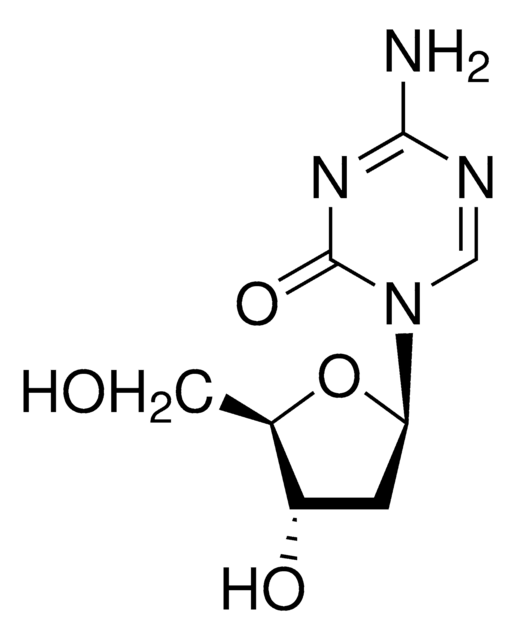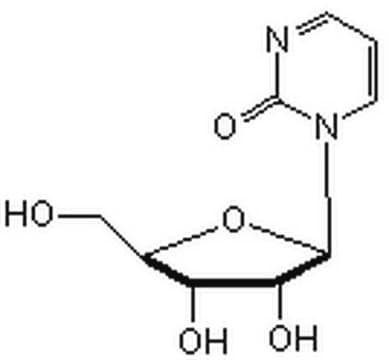Fontos dokumentumok
A3656
5-Aza-2′-deoxycytidine
≥97% (HPLC), powder, DNA methyltransferase inhibitor
Szinonimák:
2′-Deoxy-5-azacytidine, 4-Amino-1-(2-deoxy-β-D-ribofuranosyl)-1,3,5-triazin-2(1H)-one, Decitabine
About This Item
Javasolt termékek
Terméknév
5-Aza-2′-deoxycytidine, ≥97%
Minőségi szint
Teszt
≥97%
Forma
powder
oldhatóság
acetic acid: water (1:1): 50 mg/mL
kezdeményező
Eisai
SMILES string
NC1=NC(=O)N(C=N1)[C@H]2C[C@H](O)[C@@H](CO)O2
InChI
1S/C8H12N4O4/c9-7-10-3-12(8(15)11-7)6-1-4(14)5(2-13)16-6/h3-6,13-14H,1-2H2,(H2,9,11,15)/t4-,5+,6+/m0/s1
Nemzetközi kémiai azonosító kulcs
XAUDJQYHKZQPEU-KVQBGUIXSA-N
Géninformáció
human ... DNMT1(1786) , DNMT3A(1788)
Looking for similar products? Látogasson el ide Útmutató a termékösszehasonlításhoz
Általános leírás
Alkalmazás
Biokémiai/fiziológiai hatások
Tulajdonságok és előnyök
Elkészítési megjegyzés
Figyelmeztetés
Danger
Figyelmeztető mondatok
Óvintézkedésre vonatkozó mondatok
Veszélyességi osztályok
Acute Tox. 4 Oral - Eye Irrit. 2 - Muta. 2 - Repr. 1B - Skin Irrit. 2 - STOT SE 3
Célzott szervek
Respiratory system
Tárolási osztály kódja
6.1C - Combustible acute toxic Cat.3 / toxic compounds or compounds which causing chronic effects
WGK
WGK 3
Egyéni védőeszköz
dust mask type N95 (US), Eyeshields, Gloves
Válasszon a legfrissebb verziók közül:
Már rendelkezik ezzel a termékkel?
Az Ön által nemrégiben megvásárolt termékekre vonatkozó dokumentumokat a Dokumentumtárban találja.
Az ügyfelek ezeket is megtekintették
Cikkek
Bis-Tris SDS-PAGE gel casting kits with mPAGE® TurboMix technology for rapid, reliable gel casting and protein separation.
Cancer research has revealed that the classical model of carcinogenesis, a three step process consisting of initiation, promotion, and progression, is not complete.
We offer a variety of small molecule research tools, such as transcription factor modulators, inhibitors of chromatin modifying enzymes, and agonists/antagonists for target identification and validation in gene regulation research; a selection of these research tools is shown below.
Tudóscsoportunk valamennyi kutatási területen rendelkezik tapasztalattal, beleértve az élettudományt, az anyagtudományt, a kémiai szintézist, a kromatográfiát, az analitikát és még sok más területet.
Lépjen kapcsolatba a szaktanácsadással
![Adenosine 5′-[γ-thio]triphosphate tetralithium salt ≥75% (HPLC), powder](/deepweb/assets/sigmaaldrich/product/structures/319/398/e29221c2-3649-455b-bd33-583bb017ec7d/640/e29221c2-3649-455b-bd33-583bb017ec7d.png)










